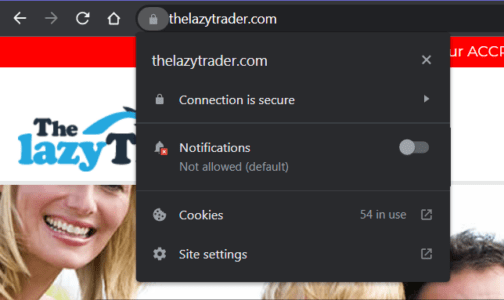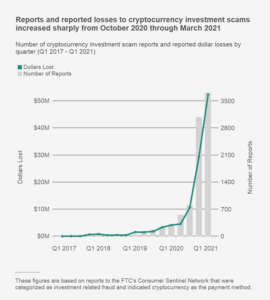
by Glen Goodman
November 4, 2021 Updated October 22, 2023
411
1 votes
Reading time: 10 minutes
Investors are the number one target for scammers. Inevitably, cryptocurrency investors are in the crosshairs of the con artists right now, because crypto trading and blockchain is relatively new, exciting and lightly regulated. There are a lot of people hoping to make big money fast, and the scammers are all too happy to dangle that false promise. It’s vital you understand how cryptocurrency scams work so that you can spot them before it’s too late.Those of us trying to grow our capital need to remain ever-vigilant. It’s the same story all over the world. For example, these figures from the Australian government show that investors are the biggest victims of scamming – by far.
The firm's main research and development office is based in Tel Aviv Israel. It originally specialized in Forex and indices spreadbetting and CFDs but has recently expanded in stock trading also. At the time of writing, eToro has 2.2 out of 5 star on Trust pilot. The comments suggest that the platform offers some impressive features but withdrawing money can be difficult. Having said that, some of the negative reviews appear to be rants rather than constructive criticism. This can be examples of traders losing money through their own recklessness rather than eToro's fault. You should therefore take this reviews with a pinch of salt. OANDA is a global financial services company providing advanced currency solutions to both retail and corporate clients all over the world. In this article, we are going to review this broker’s trading options, tools, platforms, spreads, commissions, security measures, and educational resources to help traders make the right choice. AvaTrade offers a wide variety of trading solutions (spread trading, CFDs, and social trading), and peace of mind with its comprehensive regulation, covering the EU, Australia, Canada and South Africa. Clients can use a variety of platforms for discretionary and automated trading.![]() Best Award Winning Brokers
Best Award Winning Brokers Show Search Filters
Show Search Filters
76% of retail investor accounts lose money when trading CFDs with this provider.
76.6% of retail investor accounts lose money when trading CFDs with this provider. You should consider whether you understand how CFDs work and whether you can afford to take the high risk of losing
76% of retail investor accounts lose money when trading CFDs with this provider.

Cryptocurrency scams all have one thing in common – the promise of guaranteed returns and crypto riches if you hand over some of your money to the trickster. They are fraudulent schemes designed to deceive individuals into sending digital assets or money to scammers under the pretense of an investment opportunity. Red flags may include high guaranteed returns, pressure to buy in quickly, and lack of clear information or dubious white papers. The Federal Trade Commission (FTC) and the Securities and Exchange Commission (SEC) provide resources to help consumers identify such scams.
Cryptocurrency scammers employ a variety of sometimes-ingenious schemes to lure in their unsuspecting victims. Their key advantage is that even ‘legitimate’ crypto companies are often unregulated and based in sketchy tax havens, so crypto investors don’t always immediately view those factors as warning signs. Even the most famous cryptocurrency, Bitcoin, was invented by an anonymous person or persons. These days it is not unusual for crypto investors to entrust their money to projects controlled by completely anonymous creators.

But knowing the identity of the person behind an investment scheme is not always enough either. One of the most famous scams, the multi-billion-dollar OneCoin fraud, had a well-known founder in German-Bulgarian businesswoman Ruja Ignatova, who even has a doctorate in law. She is still on the run, whereabouts unknown, but was seen as a Crypto genius. That is why it is so important to fully understand the nature of the venture you’re handing your money over to.
In “romance scams”, fraudsters use dating apps to build trust with a victim, then propose a lucrative investment opportunity in cryptocurrency. The victim is often persuaded to provide sensitive information, including private keys to their digital wallets, leading to loss of their digital assets. The FTC has warned against such scams as they’ve become increasingly prevalent.
 Fraudsters sometimes set up websites offering fake investing services, where you deposit crypto assets and so-called “investment managers” will take care of your investment. Mirror Trading International was a very plausible-looking investment company, as you can see from their website screenshots. They were tapping into the growing demand for mirror trading. MTI promised to use algorithms to build profits quickly. Scammers like to use this ruse because it sounds clever. It’s also impossible to verify one way or the other, unless you have access to the source code of the ‘algorithm’. Of course you never do.
Fraudsters sometimes set up websites offering fake investing services, where you deposit crypto assets and so-called “investment managers” will take care of your investment. Mirror Trading International was a very plausible-looking investment company, as you can see from their website screenshots. They were tapping into the growing demand for mirror trading. MTI promised to use algorithms to build profits quickly. Scammers like to use this ruse because it sounds clever. It’s also impossible to verify one way or the other, unless you have access to the source code of the ‘algorithm’. Of course you never do.

The South African CEO disappeared in December 2020 and it’s estimated by leading cryptocurrency research analysts Chainalysis that 588 million US dollars have vanished. The South African financial regulator first warned the public in August 2020 not to invest in MTI. Despite the warning, the number of investors rocketed from 60,000 to 280,000 before the site was shut down.
Bogus investment companies often accept a small initial upfront investment, then phone or send a text message to their ‘client’ to tell them the investment has performed incredibly well, but that the client needs to send more money in order to ‘release the profit’ back to their own bank account. It is at this point that many victims start to see red flags. But the company representatives can be very persuasive and very persistent, all the time dangling an enormous – but fictitious – ‘profit’ in front of the client.
Many of us have received emails claiming that some celebrity is ‘making a fortune’ by investing in a Bitcoin-themed investment. Inevitably, if you click on the links in the email, you’ll go through to a scam investment website similar to the ones I described in the previous section.
Usually, the celebrity in question is not involved at all! And some of them are very angry about it. Martin Lewis, the British money-saving expert, is probably the most prominent of these. All of Martin’s efforts to warn people apparently have not deterred the scammers, who still send out millions of these emails every day.
Copycat accounts are the scourge of Twitter. They usually pretend to be a celebrity and promise to ‘double your money’ if you simply send the tweeter some Bitcoin.
This scam can be incredibly convincing, as it often comes from what looks like a genuine Twitter account, complete with blue tick to show the account has been verified by Twitter. The scammer simply hacks into or buys a verified Twitter account and then changes the name and photo to match a famous investor or celebrity.
Many people have lost their life savings by trusting scammers who they believed to be Elon Musk.
Sometimes new cryptocurrencies are invented to lure people into fake investments. These ‘cryptos’ may or may not have actual computer code written to make them a real cryptocurrency, but the result is the same and is known as a ‘rug pull’. This is a cryptocurrency scam project that raises funds with an initial coin offering, before the hackers abandon the project and run away with the money they have raised. This same approach can be taken using non-fungible tokens, or NFTs.

In an industry where some of the biggest profits are made by investing early in tiny new projects founded by anonymous shadowy figures, it is all too easy to suck investors into rug-pull scams. Sometimes the ‘coin’ is a straight-forward ponzi scheme, a fraud set up to enrich the founders at the expense of its members. The implosion of Bitconnect in 2018 cost investors billions. One such investor, who became famous for his enthusiasm at Bitconnect’s peak, was Carlos Matos, shown below screaming with excitement at a huge audience in Thailand back in 2017. Three years later, The US financial regulator, the SEC, brought charges against the Bitconnect founders.
Thieves design phishing emails and messages to look like communications sent by a cryptocurrency platform you have a genuine account with. They will usually tell you to click a link in order to access your crypto account. The link will then go through to a fraudulent website with all the same graphics and branding as the real crypto platform, so it will often look quite genuine.
Typically it will ask you to input your account name, password and other security details. Of course the scammers will then be able to use these to access your account and possibly to transfer your funds to themselves.
Coinbase users are sometimes victims of phishing scams. The fraudsters choose Coinbase because it is the most well-known crypto platform in the world.
Always think carefully before clicking!
Cryptocurrencies typically operate so far outside of a government regulatory umbrella that it can be very difficult to tell what is legitimate and what is not. A scammer may create a website in the morning, fully code a cryptocurrency and release it onto the market by lunchtime, and it can be worth millions by dinner time. The biggest winners are usually those who get in super-early. Fortunes are sometimes made overnight.

For example, meme cryptocurrency Shiba Inu, which is nothing more than a simple payment mechanism based around the cartoon image of a dog, became worth tens of billions of dollars in 2021. One investor put in $8,000 which then became worth $5.7 billion! With fortunes like this appearing in the international press, many investors want to rush in. It is crucial to take a breath and carry out some due diligence on the project. Remember, for every overnight billionaire, there are thousands of people losing their life savings to cryptocurrency scams, extortion and crypto fraud. Sadly, their stories rarely make the international press.
When you visit your cryptocurrency platform or private Crypto wallet, you need to ensure you are not visiting a spoof site. Do not click on a link in an email or message. Instead, type out the website address and make sure you can see the padlock symbol on the left.

If you are accessing your account or wallet through an app, make sure it is a genuine app. Check the app store and ensure that many thousands or millions of other users also downloaded that app. Only download your crypto apps from the Apple App Store or from the Google Play Store.
The first thing to do is to see if you can get your money back! If you paid the scammer using a credit card, contact your card company and tell them you have been scammed. You may be able to claim back the money you lost.
If you paid using a bank transfer, then contact your bank’s security team and explain the situation. If you get no joy from them, it is time to contact your country’s financial regulator. They may be able to help you get compensation and they will also hopefully publish a warning about the scam to deter other investors.
Simple. It is the biggest ones, particularly Bitcoin and Ethereum. Their networks are considered very secure, so if you keep your cryptocurrency holdings in a reputable private digital wallet, and keep the passwords safe, it is very unlikely your crypto will be stolen. Investors consider many other major cryptocurrencies to be pretty safe too.
The one glaring exception is Tether, which is very different from most other big cryptos. Tether is a ‘stablecoin’, linked to the US dollar, whereby 1 Tether = 1 US dollar in value. Tether’s management supposedly have one dollar available for every Tether unit in existence and so if everybody decided to cash in their Tethers for dollars, the company would give them all back their dollars. The only problem is… they may not actually have enough dollars to pay everybody back! U.S. regulators have fined and criticised the company for lack of transparency. So if you keep any of your money in Tether currency, keep one eye on the exit at all times. You never know if or when the currency may suddenly collapse and become worth a lot less or even nothing at all.
After that miserable warning, let’s just remember that most major cryptocurrencies are wonderfully secure and very difficult to steal. The problem is not usually with the cryptocurrencies themselves but with the wallets, platforms and cryptocurrency exchanges built around them.
The short answer is… nobody! Yes, people do not call it the Wild West for nothing. There is no overriding authority and quite often there’s nobody to hold your hand if you get scammed.
Every country has its own financial regulator and they all have different attitudes and approaches to cryptocurrency. For instance, in the UK people look to the Financial Conduct Authority, but actually they have no jurisdiction to regulate cryptocurrency at all! They encourage crypto companies to register in the UK, but that is a different thing to properly regulating the operations of these companies. What the FCA mostly does is warn about the dangers of investing in cryptocurrency.
In the United States, regulators and politicians are starting to take a more proactive approach. They still like to warn people about investing in crypto but they are also trying to figure out regulation. We are likely to see a lot of new rules from the SEC and the CFTC regulators in future.

In my opinion the safest wallet offered by a platform has to be Coinbase’s wallet. Coinbase is an American company and it went public on the Nasdaq stock exchange in 2021. Because of this, it has a greater level of outside scrutiny than any other crypto exchange. It is still a corporation with employees and so it’s vulnerable to insider thefts.
That means its wallet isn’t perfectly secure. But the small amount of U.S. regulation provides a degree of reassurance.So-called ‘cold wallets’ stored on hardware devices not connected to the internet are the safest wallets of all. However, most crypto traders find that level of security a little too inconvenient.
The golden rule for avoiding cryptocurrency scams is simple:
“If it seems too good to be true, it probably is”.
Put your sceptical hat on whenever you watch or read anything to do with crypto investing. Even when they aren’t blatant cryptocurrency scams, many projects offer little value and exist purely to separate you from your money.
The trouble is it’s the sketchy little projects that often offer the greatest potential profits, so a lot of people find themselves sucked into rug-pulls and other scams. There is gold in them there hills, but do your utmost to ensure what you are digging up is not just fool’s gold but the real thing.
Cryptocurrency trading is not legal is every country. China is the most high-profile example of a country that has made it illegal. Some major crypto exchanges have limited Chinese crypto traders to selling only.
Cryptocurrency scams contribute to an overall atmosphere of suspicion with institutional traders. This makes them reluctant to invest. Many criminals swirl around the crypto world, which makes the whole industry look grubby. That’s a shame, because most people in the crypto industry are simply busy trying to build useful apps.
To protect yourself, stay informed about common scams and red flags. Always research an investment opportunity thoroughly, scrutinize white papers for ICOs, and confirm wallet addresses before transferring any digital assets. Keep your private keys and sensitive information secure. Never invest more than you can afford to lose. And remember, if an investment sounds too good to be true, it probably is.
The four most common cryptocurrency scams include Initial Coin Offering (ICO) scams, pump-and-dump schemes, giveaway scams, and romance scams.
‘Safe’ is never a word I’d use for crypto investing. It is a high-risk investment asset class. Most crypto prices buck up and down wildly. If you can learn how to tame that wild animal, the rewards can be tremendous.

